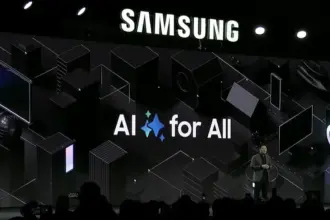The search landscape is on the verge of a dramatic transformation. Google, the undisputed king of search, is reportedly testing a new “AI Mode” for its search engine, and it’s poised to revolutionize how we find information online. This isn’t just another algorithm tweak; it’s a fundamental shift towards a more conversational, interactive, and personalized search experience powered by artificial intelligence.
Think of it like having a conversation with a knowledgeable librarian who anticipates your needs and guides you towards the best resources. Instead of simply typing keywords and sifting through pages of results, you’ll be able to ask questions in natural language and receive concise, comprehensive answers drawn from the vast ocean of data Google has access to.
This isn’t entirely out of the blue. Google has been steadily integrating AI into its products for years, from the sophisticated algorithms that power its search rankings to the voice recognition capabilities of Google Assistant. But “AI Mode” represents a significant leap forward, bringing these technologies together to create a truly intelligent search experience.
While Google has remained tight-lipped about the details, internal sources have provided a glimpse into what we can expect. “AI Mode” appears to be built on the foundation of Google’s latest language models, including MUM and LaMDA, which are capable of understanding and generating human-like text with remarkable accuracy. This allows the search engine to not only comprehend the intent behind your queries but also to synthesize information from multiple sources and present it in a way that is both informative and engaging.
What to Expect from Google’s “AI Mode”
Based on early reports, here are some of the key features that are likely to be included in the new search experience:
- Conversational Search: Say goodbye to keyword stuffing and hello to natural language queries. You’ll be able to ask questions just as you would to a human, and the search engine will understand the nuances of your request. For example, instead of typing “best Italian restaurants near me with outdoor seating,” you could simply ask, “Where can I find a good Italian restaurant with a patio nearby?”
- AI-Powered Summaries: No more clicking through endless links to find the information you need. “AI Mode” will be able to generate concise summaries of relevant web pages, highlighting the most important details and saving you valuable time. Imagine searching for “the history of the Roman Empire” and receiving a succinct overview drawn from various historical sources, all without having to leave the search results page.
- Personalized Results: The search experience will be tailored to your individual interests and preferences. If you frequently search for recipes, for example, “AI Mode” will learn your culinary tastes and prioritize results that align with your preferences. This personalization will extend beyond your search history, potentially incorporating data from other Google services like Gmail and YouTube to provide even more relevant results.
- Interactive Exploration: “AI Mode” will go beyond simply providing answers. It will encourage you to explore related topics and delve deeper into areas of interest. Imagine searching for “climate change” and being presented with an interactive map showing the impact of rising temperatures around the world, along with links to articles, videos, and other resources that can help you learn more.
- Multimodal Search: The lines between text, images, and videos will blur. You’ll be able to search using a combination of different modalities. For instance, you could take a picture of a landmark and ask, “What is the history of this building?” or hum a tune and ask, “What song is this?”
The Potential Impact of “AI Mode”
The implications of this new search paradigm are far-reaching. It has the potential to transform not only how we find information but also how we interact with the world around us. Here are just a few of the ways “AI Mode” could impact our lives:
- Enhanced Productivity: By providing quick and accurate answers to our questions, “AI Mode” could significantly boost our productivity. Imagine being able to research complex topics, find relevant data, and complete tasks in a fraction of the time it currently takes.
- Deeper Understanding: The ability to synthesize information from multiple sources and present it in a clear and concise manner could lead to a deeper understanding of complex issues. This could empower us to make more informed decisions about everything from our personal finances to our political views.
- Increased Accessibility: “AI Mode” could make information more accessible to people with disabilities. For example, voice search and AI-powered summaries could be a game-changer for individuals with visual impairments.
- New Opportunities for Businesses: Businesses will need to adapt their online presence to this new search landscape. Optimizing content for conversational queries and leveraging AI-powered tools will be crucial for success.
Challenges and Concerns
While the potential benefits of “AI Mode” are undeniable, there are also challenges and concerns that need to be addressed.
- Accuracy and Bias: AI models are trained on vast amounts of data, and if that data contains biases, those biases can be reflected in the search results. Google will need to ensure that its AI models are fair and unbiased, and that they provide accurate and reliable information.
- Privacy: “AI Mode” will rely on collecting and analyzing user data to personalize the search experience. Google will need to be transparent about how it collects and uses this data, and it will need to provide users with control over their privacy settings.
- Job Displacement: Some have raised concerns that “AI Mode” could lead to job displacement, particularly for those who work in fields like customer service and research. However, it’s also possible that “AI Mode” will create new jobs and opportunities, particularly in areas like AI development and data analysis.
The Future of Search is Intelligent
Google’s “AI Mode” is still in its early stages of development, but it offers a tantalizing glimpse into the future of search. It’s a future where search is more conversational, personalized, and intelligent than ever before. While there are challenges to overcome, the potential benefits are enormous. As Google continues to refine and expand this technology, we can expect to see a profound shift in how we access and interact with information online.
This is not just an incremental improvement; it’s a paradigm shift that could redefine our relationship with the internet. Just as the introduction of the graphical user interface and the web browser revolutionized computing, “AI Mode” has the potential to revolutionize search, making it more intuitive, accessible, and powerful than ever before. The future of search is intelligent, and it’s coming sooner than you might think.






























